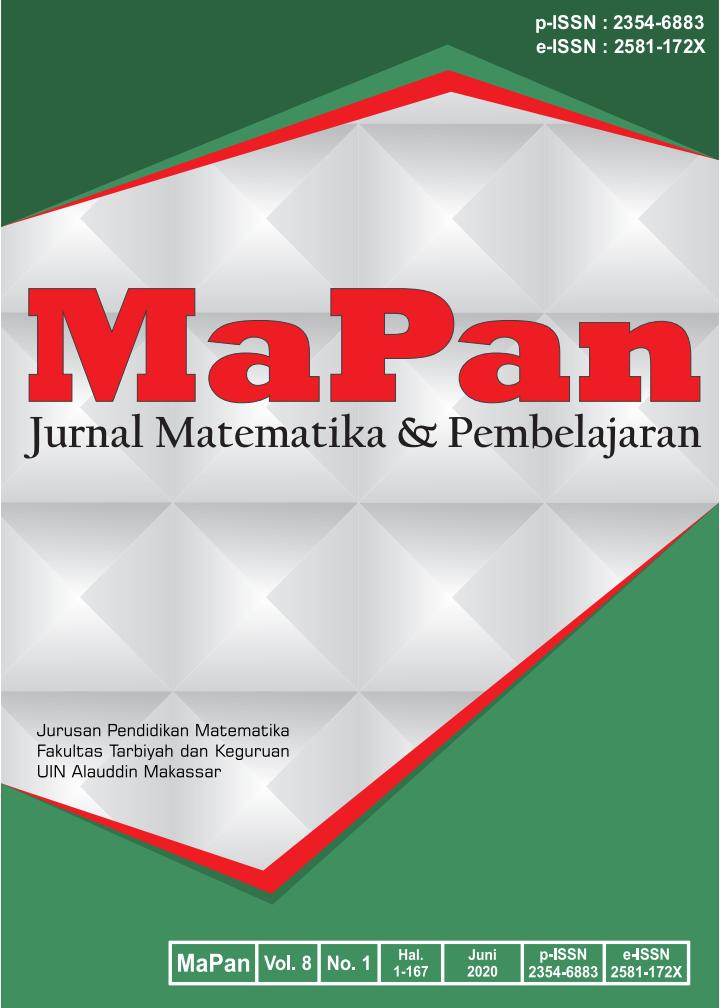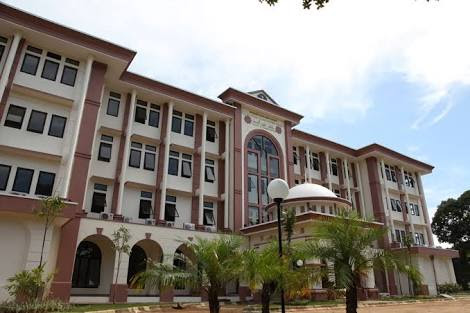INVESTIGATING THE NUMBER SENSE ABILITY OF PRE-SERVICE MATHEMATICS TEACHERS
Abstract
Abstract:
This research aims to identify the components of number sense of pre-service mathematics teachers. Pre-service mathematics teachers need a good number sense ability as a provision to transfer knowledge to students. This research uses a quantitative method. Subjects in this research are 14 third year pre-service mathematics teachers. The instrument used was in the form of 30 items of number sense questions that were developed based on number sense components, that is, understanding and skills about numbers, using number and operations on numbers, and using number and operation skills in calculations. The results showed that number sense ability of pre-service mathematics teachers' was still at a moderate level, which is 76.67%. Pre-service mathematics teachers also lack numbers' comprehension and skills elements.
Abstrak:
Penelitian ini bertujuan untuk menyelidiki komponen number sense mahasiswa calon guru matematika. Calon guru matematika memerlukan kemampuan number sense sebagai bekal untuk mentransfer pengetahuan kepada siswa. Penelitian ini merupakan penelitian kuantitatif. Subjek penelitian adalah 14 calon guru matematika tahun ketiga. Instrumen yang digunakan berupa 30 item soal number sense yang dikembangkan berdasarkan komponen number sense, yaitu pemahaman dan keterampilan tentang bilangan dan penggunaan operasi bilangan, dan menerapkan keterampilan bilangan dan operasi dalam perhitungan. Hasil penelitian menunjukkan bahwa kemampuan number sense mahasiswa calon guru matematika masih berada pada level sedang yakni 76,67%. Mahasiswa calon guru matematika masih lemah dalam komponen pemahaman dan keterampilan tentang bilangan.
Downloads
References
Akkaya, R. (2015). An investigation into the number sense performance of secondary school students in Turkey. Journal of Education and Training Studies, 4(2), 113–123. https://doi.org/10.11114/jets.v4i2.1145.
Altay, K. M., & Umay, A. (2013). The development of number sense scale towards middle grade students. Egitim Ve Bilim-Education and Science, 38(167), 241–255. Retrieved from https://avesis.hacettepe.edu. tr/yayin/99ef796a-876f-44d5-b1b4-baa1b9bb5690/the-development-of-number-sense-scale-towards-middle-grade-students.
Aktas, M. C., & Ozdemir, E. T. (2017). An examination of number sense performances of preservice elementary school mathematics teachers. European Journal of Education Studies, 3(12), 133–144. https://doi.org/10. 5281/zenodo.1117088.
Hadi, S. (2015). Number sense : Berpikir fleksibel dan intiusi tentang bilangan. Math Didactic: Jurnal Pendidikan Matematika, 1(1), 1–7. Retrieved from http: //eprints.ulm.ac.id/2128/.
Hadiyanto, F. R., & Wulandari, N. P. (2019). Identifikasi Kesalahan siswa kelas vii dalam menyelesaikan soal cerita geometri dengan newman’s procedure. Mandalika Mathematics and Education Journal, 1(2), 81–86. https://doi.org/10.29303/mandalika.v1i2.1512.
Koleza, E., & Koleli, M. (2014). Investigating prospective elementary teachers' number sense through mental computation strategies. MENON: Journal Of Educational Research., 1st Thematic Issue Florina, 126–143. Retrieved from http://www.edu.uowm.gr/site/book/export/html/487.
Lemonidis, C., & Kaimakami, A. (2013). Prospective elementary teachers' knowledge in computational estimation. MENON: Journal Of Educational Research., Issue 2b, 86–98. Retrieved from https://edu.uowm.gr/ site/sites/default/files/charalambos_lemonidis_anastasia_kaimakami_prospective_elementa.pdf.
Maulyda, M. A., & Hidayati, V. R. (2019). Representasi matematis visual anak ditinjau dari bakat musik. EDU-MAT: Jurnal Pendidikan Matematika, 7(2), 149–158. https://doi.org/10.20527/edumat.v7i2.6855.
McIntosh, A., Reys, B. J., & Reys, R. E. (1992). A proposed framework for examining basic number sense. For the Learning of Mathematics, 12(3), 2–8. Retrieved from https://flm-journal.org/Articles/94F594EF72C03412F1 760031075F2.pdf.
Mohamed, M., & Johnny, J. (2010). Investigating number sense among students. 8(5), 317–324. https://doi.org/10.1016/j.sbspro.2010.12.044.
Muir, T. (2012). What is a reasonable answer ? Ways for students to investigate and develop their number sense. Australian Primary Mathematics Classroom, 17(1), 21–28. Retrieved from https://files.eric.ed.gov/ fulltext/EJ978131.pdf.
NCTM. (2000). Principles and standards for school mathematics. In The National Council of Teachers of Mathematics, Inc. The National Council of Teachers of Mathematics, Inc. Retrieved from https://www.cambridge. org/core/product /identifier/S0007125000082039/type/journal_article.
Safitri, A. S., Mulyati, S., & Chandra, T. D. (2017). Kemampuan number sense siswa sekolah menengah pertama kelas VII pada materi bilangan. Prosiding SI MaNIs (Seminar Nasional Integrasi Matematika dan Nilai Islami), 1(1), 270–277. Retrieved from http://conferences.uin-malang.ac.id/ index.php/SIMANIS/article/view/85.
Sengul, S. (2013). Identification of number sense strategies used by pre-service elementary teachers. Educational Sciences: Theory & Practice, 13(3), 1965–1974. https://doi.org/10.12738/estp.2013.3.1365.
Sengul, S., & Gulbagcı, H. (2012). Evaluation of number sense on the subject of decimal numbers of the secondary stage students in Turkey. International Online Journal of Educational Sciences, 4(2), 296–310. https://doi.org/ 10.1016/j.sbspro.2012.05.472.
Tsao, Y.-L., & Lin, Y.-C. (2012). Elementary school teachers' understanding towards the related knowledge of number sense. US-China Education Review B, 1, 17–30. Retrieved from https://eric.ed.gov/?id=ED531655.
Walidah, N. Z., Kusaeri, & Yudi, U. (2019). Mengoptimalkan dukungan guru dalam melibatkan siswa menggunakan argumentasi kolektif pada pembelajaran matematika. MaPan: Jurnal Matematika dan Pembelajaran, 7(2), 261–280. https://doi.org/10.24252/mapan.2019v7n 2a7.
Wasiu, O. I., & Abiola, O. A. (2019). Enhancing the conceptual, procedural, and flexible procedural knowledge of pre-service mathematics teachers in algebra. 4(2), 66–78. https://doi.org/10.23917/jramathedu.v4i2.8363.
Yaman, H. (2015). The mathematics education i and ii courses' effect on teacher candidates' development of number sense. Educational Sciences: Theory & Practice, 15(4), 1119–1135. https://doi.org/10.12738/estp.2015.4. 2322.
Yang, D. C., Reys, R. E., & Reys, B. J. (2009). Number sense strategies used by pre-service teachers in Taiwan. International Journal of Science and Mathematics Education, 7(2), 383–403. https://doi.org/10.1007/s10763-007-9124-5.
Yang, D. (2005). Number sense strategies used by 6th‐grade students in Taiwan. Educational Studies, 31(3), 317–333. https://doi.org/10.1080/ 03055690500236845.
Yang, D., & Li, M. F. (2008). An investigation of 3rd‐grade Taiwanese students' performance in number sense. Educational Studies, 34(5), 443–455. https://doi.org/10.1080/03055690802288494.
Copyright (c) 2020 Nourma Pramestie Wulandari, Vivi Rachmatul Hidayati, Dwi Novitasari, Tabita Wahyu Triutami, Ulfa Lu’luilmaknun

This work is licensed under a Creative Commons Attribution 4.0 International License.


